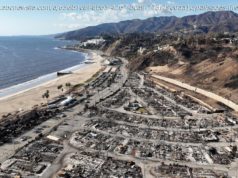“Total moral collapse.”
When President Donald Trump declared that “both sides” were responsible for the violence in Charlottesville during his Tuesday afternoon press conference, Paul Staniland’s alarm bells started ringing.
Staniland is a political scientist at the University of Chicago who studies political violence around the world; his research had taught him that rhetorical support, even tacitly, from mainstream political leaders can encourage violence from radical groups. Trump’s statements, he believes, literally made further neo-Nazi violence more likely.
“I study violence, killing, political disorder for a living. I have a pit in my stomach after today’s press conference. Total moral collapse, ” Staniland tweeted after the presser. “Odds of non-state violence soar when state officials give it cover and legitimacy. Dangerous and staggeringly irresponsible.”
I wanted to understand just how worried we should be about this effect, so I gave Staniland a call on Wednesday afternoon. He cautioned that some hyperbolic headlines — like “ Is America headed for a new kind of civil war? ” — were overstating the risks. But nonetheless, he told me, the research is very clear: Radical groups elements draw major strength from any kind of mainstream legitimation. If Trump had credibly condemned neo-Nazis and white supremacy, it would be harder for them to sell themselves to potential followers and activists as a viable political movement.
Trump tried to do this in a scripted Monday statement, but fatally undermined it on Tuesday by saying “there’s blame on both sides” and even sympathizing with the alt-right protest’s stated aim of protecting a monument to the Confederacy. The white supremacists got the message. “Thank you President Trump for your honesty & courage to tell the truth, ” former KKK Grand Wizard David Duke tweeted after the event.
When extremist groups feel like they have mainstream support, Staniland says, they’ re more likely to attract volunteers, put together new rallies, and even — yes — stage more violent attacks, like the car attack in Charlottesville that killed counter-protestor Heather Heyer .
“There’s potential for really dangerous escalation of violence, ” Staniland says, “at least in part because of Trump’s rhetoric.”
What follows is a transcript of our conversation, lightly edited for length and clarity.
When you said that you had a “pit in your stomach, ” that the “odds of non-state violence soar” after rhetoric like Trump’s — what did you mean, exactly? What does the research tell us?
As I interpreted the press conference, he was carving out a space for at least some of the protestors in Charlottesville on the neo-Nazi, neo-Confederate side. He said they were “very fine people, on both sides, ” that “you had a lot of people in the [alt-right] group that were there to innocently protest.”
In other countries — which are very different than the US in a lot of ways, so I want to be really clear that I’ m not drawing a straight analogy — that kind of rhetoric can provide political cover to non-state armed groups to act in ways that are really dangerous. They can just say “Look, we’ re just doing what the president or the leader says is acceptable.”
That is why I was so disturbed. I don’ t think the US is poised for a breakdown of civil order or a civil war that some people speculate about. It’s that the space in mainstream politics for a style of really radical right-wing politics that has been sealed off for the past couple of decades has opened.
Explain how the dynamics in foreign countries you’ re talking about would port over to the American context. In other words, what’s similar, not what’s different.
There’s a lot of research on ethnic riots and pogroms from places like India and Sri Lanka that suggest when mainstream elites are willing to do business with violence fringe actors, that they’ re able to mobilize more effectively within the police system. They don’ t expect the police to crack down as hard on them, they try to create linkages with ruling parties or parts of ruling parties, and overall encourages greater levels of mobilization.
Now, sometimes that doesn’ t turn into violence. Sometimes it doesn’ t go anywhere. But sometimes it does.
In India, you have provocative statements from ruling politicians about Muslims, which then give encouragement to [Hindu nationalists] for violence, intimidation, or coercion against Muslims. Or, in 1950s Sri Lanka, you see similar things targeting the Tamil minority [when riots led by hardline factions of Sri Lanka’s Sinhalese ethnic majority in 1958 killed hundreds of Tamils] .
So you referred to what the mainstream groups in India and Sri Lanka did as “doing business” with bigots. Does that mean what Trump is doing, just failing to condemn them or drawing moral equivalencies between oppressor and oppressed?
Trump is at one end, with his kind of “wink, wink, nudge, nudge.” In other cases, it’s very extreme political rhetoric, people like Slobodan Milošević in Yugoslavia [a Serbian leader whose forces conducted ethnic cleansing campaigns in Bosnia and Kosovo in the 1990s] . I don’ t want to exaggerate what Trump said, in terms of linking him to other figures like that.
But it’s certainly on that spectrum, in ways that we haven’ t really seen from other presidents, at least in recent years. That’s what I mean by doing business: It’s not explicitly condemning, but saying people on both sides have legitimate grievances.
To me, it’s worrisome. It opens space for certain kinds of groups to operate in the political mainstream.
So what does that look like, in concrete terms?
It looks like groups recruiting much more openly. It looks possibly like hardcore supporters of the president being inclined to look more positively on these groups than they did before. The president basically said there’s something to what these guys are saying that they should respect and pay attention to.
So I think recruitment and openness are areas where we should worry. In the reporting that we see, there’s been a surge in enthusiasm. The New York Times had a piece about how the radical white supremacist right loves that, that they’ re planning a whole other wave of activity. They feel like they’ ve been legitimized by the president.
You definitely could see further clashes. What form those take depends a lot on the police reaction and the reaction of politicians; if they try to tamp down on this, prevent these kinds of clashes, but obviously that will reduce the likelihood of violence. But I think there’s real potential for street clashes at these kinds of protests.
It’s not like there’s no precedent for this in US history. I saw a study of the US around the turn of the 20th century — you retweeted it, actually — that showed how sanction and support from US officials influenced lynching.
Home
United States
USA — Events This expert on political violence thinks Trump is making neo-Nazi attacks more...






